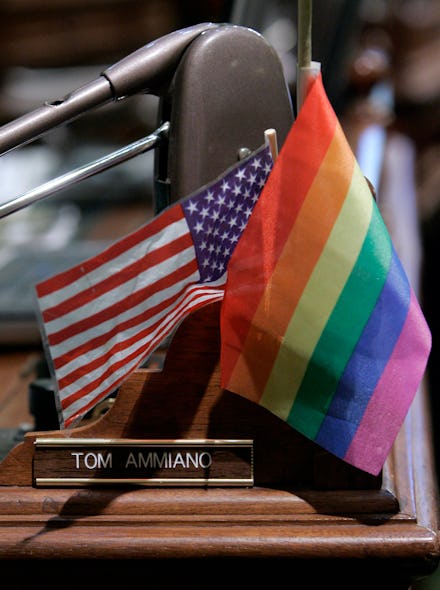Breaking Down What the Affordable Care Act Means for LGBT People

As queers, we’ve all been there: uncomfortably perched on a doctor’s table, suffering interrogation about our sexual health by professionals who just don’t seem to get it.
“What’s your preferred method of birth control?”
Strategies fly through our heads: run out the door? Lie? Hint? If you’re like me, you give the doctor your hardest-core neo-punk stare.
“Lesbianism,” you deadpan.
Awkward.
Let’s be real: health care has lots of little ways of making LGBT people feel marginalized, invisible, and sometimes unsafe. Folks in civil unions or domestic partnerships don’t have access to their partner’s insurance. Transgender-specific coverage is rarely included in employer-sponsored insurance, and uninsured trans people have extreme difficulties coming by the care they need. So we’re unlikely to trust the newest fad, even if that fad comes in the form of the Affordable Care Act.
This article from American Progress does a great job of explaining just why the Affordable Care Act is actually a good thing for us queers. Basically it’s saying that while the ACA makes coverage available and affordable for everyone, it includes specific measures to make health care safer for LGBT people. Here are some concrete benefits we can all celebrate:
Coverage for same-gender domestic partners. If you purchase a family health insurance plan through the state or federal marketplace, your partner or spouse will be included in it, where they might not have been before.
Coverage for us young-‘uns! We all know you don’t turn 18 and magically gain the financial wherewithal to buy health insurance, so with the Affordable Care Act we can now stay on our parents’ plans until we’re 26!
Companies can’t discriminate against you based on your gender identity, or health care costs related to transitioning.
It’s affordable. Instead of you begging for coverage from powerful insurance giants, the ACA makes companies compete to give you the best deal. And if that still seems out of reach, there are programs to help you cover the cost.
The ACA features education programs for health care professionals. It’s true that HIV/AIDS is prevalent in the LGBT community, and it’s true that we have different needs when it comes to sexual health. With the ACA, we have a better chance of our doctors being less thick-headed about our orientation, identity, and needs.
It’s not perfect. Shopping for health insurance is a daunting task, especially when you’d rather be out practicing with your kickball league or designing fliers for your kale and quinoa brunch. (No? Just me? That’s cool.) But sooner or later we all need health care, and the Affordable Care Act is making huge strides in making that care cheap and safe for all.
Want to enroll in health care? Visit Healthcare.org today.
To learn more about how the ACA affects LGBT people, visit Out2Enroll.org